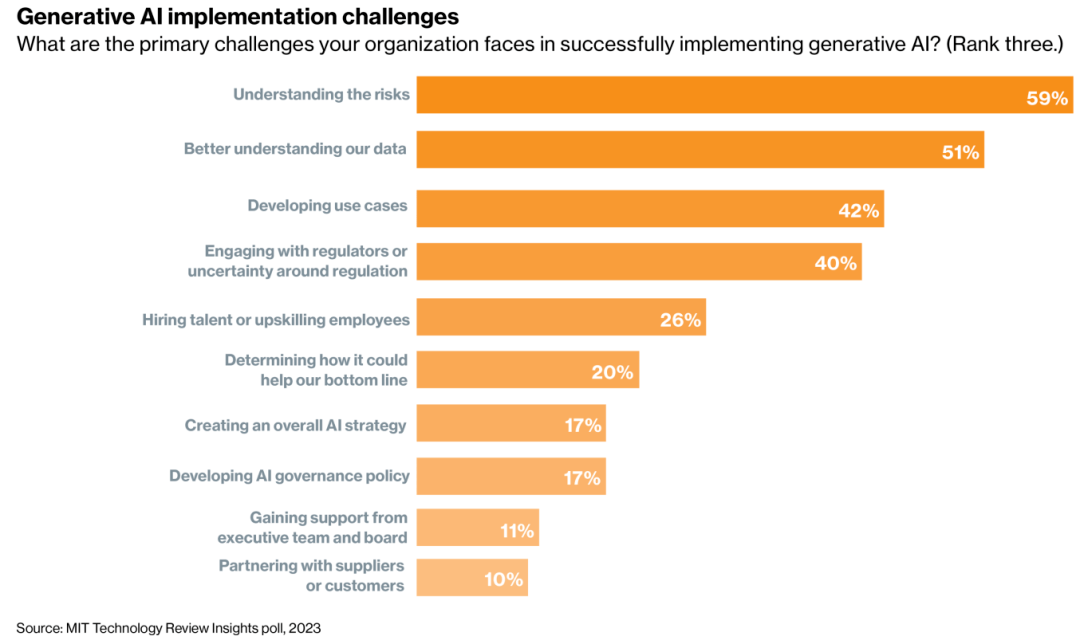
After over-hyping a range of technologies including Web3, virtual worlds and blockchain, business executives are bracing for a wave of generative artificial intelligence. Some believe that artificial intelligence will bring about changes comparable to the birth of the Internet or the emergence of desktop computers
But with greater ability comes greater responsibility. Generative AI brings as much risk as reward. This technology is challenging legal regimes around copyright and intellectual property, creating new cyber and data governance threats, and causing “automation anxiety” in labor-intensive activities.
To meet stakeholder expectations, companies need to act quickly but must do so carefully to ensure they do not violate regulations or ethical standards in areas such as data privacy and bias
On the operational side, enterprises need to reconfigure human resources and establish partnerships with technology companies to design safe, effective, and reliable generative artificial intelligence
To gauge the current thinking of key business decision-makers, MIT Technology Review’s Insights panel surveyed 1,000 business executives, asking them about current and anticipated AI use cases, implementation barriers, and technology strategies. and perspectives on workforce planning
Based on the opinions of an expert interview panel, this survey reflects the current mainstream strategic thinking factors and perspectives of enterprises in the face of generative artificial intelligence, and can help executives reason and explain the process of making major decisions
The following are the main results of the survey and interviews:
Executives are well aware of the transformative potential of generative AI, but they are wary of deploying it. Nearly all companies believe generative AI will impact their business, with only 4% believing it will not impact them. But at this point, only 9% have fully deployed generative AI use cases in their organizations.
This figure is as low as 2% in the government sector, while financial services (17%) and IT (28%) are the two industries with the highest proportion of use case deployments. The biggest barrier to deploying AI is understanding the risks of generative AI, with 59% of respondents citing it as one of the top three challenges.
 (Source: see watermark)
(Source: see watermark)
At the same time, companies will not fight alone. Collaboration with startups and large tech companies is critical to the smooth expansion of AI technology. The majority of executives (75%) plan to work with partners to introduce generative AI at scale to their organizations, with fewer (10%) citing collaboration as the top technology implementation challenge. This demonstrates that we have a strong ecosystem of technology providers and services available for collaboration and co-creation.
Big tech companies have ecosystem advantages as developers of generative AI models and providers of AI software, but startups have advantages in several specialized niche areas. Executives are more likely to plan to partner with smaller companies (43%) that focus on a certain direction of AI technology than with large tech companies (32%).
The application of generative AI will democratize the entire economy. According to our survey, company size has no bearing on the likelihood that a company will experiment with generative AI. Small companies (less than $500 million in annual revenue) deploy generative AI at three times the rate of mid-sized companies ($500 million to $1 billion) (13% vs. 4%)
In fact, these smaller companies are deploying and experimenting with AI technology at rates similar to those of the largest companies (those with more than $10 billion in revenue).
Affordable generative AI tools that can boost small businesses just like cloud computing, which gives businesses access to more tools and computing resources that once required hardware and technology make huge investments.
A quarter of respondents expect the main impact of generative AI to be a reduction in their workforce. The share is even higher in industrial sectors such as energy and utilities (43%), manufacturing (34%), and transportation and logistics (31%). This figure is lowest in the IT and telecommunications industry (7%)
In general, compared with humans being replaced by artificial intelligence, this data (proportion) is acceptable. Demand for related skills is increasing in technical areas focused on operating artificial intelligence models, as well as in management positions that deal with ethics and risk.
Artificial intelligence is democratizing technical skills, potentially leading to new job opportunities and increased employee satisfaction. But experts warn that if not deployed correctly and without meaningful consultation, generative AI could reduce the quality of human work experience
Regulatory issues are urgent, but uncertainty is currently the biggest challenge. Generative AI has sparked a flurry of policy-making activity as lawmakers in countries like the United States try to avoid risks, but truly impactful regulation will advance at the pace of government legislation (slowly)
Meanwhile, many business leaders (40%) believe that dealing with regulatory or regulatory uncertainty is a major challenge in adopting generative AI. This proportion varies by industry, ranging from 54% in the government sector to 20% in the IT and telecoms industry.
The above is the detailed content of Small companies are three times more likely to deploy large generative AI models than mid-sized companies, survey reveals. For more information, please follow other related articles on the PHP Chinese website!




